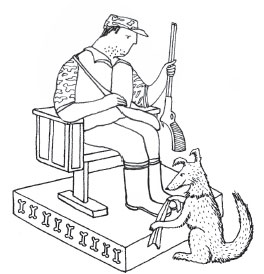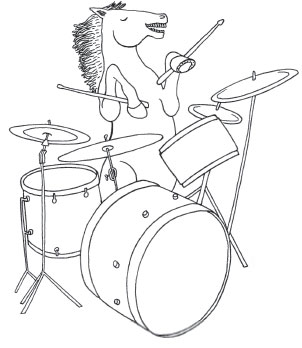


He that would have good luck in
horses must kiss the parson’s wife
(1678)
By long tradition in Britain, certain outdoor activities have been elevated to a higher category, that of ‘field sports’. The most controversial of these is currently banned by law, though what this ban actually amounts to is anyone’s guess:
own the moment in a hunt when the hounds show that they have found a scent
cut a voluntary to fall off one’s horse while hunting
craner (c.1860) one who hesitates at a difficult jump
tantivy (1641) at full gallop
shoe-polisher a derisive term for a dog that doesn’t stray far from a hunter’s feet

Since 2004 deer can no longer be pursued with hounds in the UK, marking the end of a tradition dating back well before these terms from the Tudor-Stuart period:
abatures the traces left by a stag in the underwood through which he has passed
velvet-tip the down upon the first sprouting horns of a young deer
rascal a lean deer not fit to hunt
rechate the calling together of the hounds in hunting
dowcets the testicles of a deer
You may however still stalk and shoot these animals, as you may game birds such as pheasant or grouse. Which is perhaps ironic when you consider how much more efficient an instrument a gun is than a pack of hounds. As the Victorian dramatist W. S. Gilbert put it, ‘Deer stalking would be a very fine sport if only the deer had guns’.
collimate (1837) to close an eye to aim at a target
nipshot (1568) in shooting: amiss in some way
fire into the brown (1871) shooting into the midst of a covey instead of singling out one bird
tailor (1889) to shoot at a bird, trying to miss
air washed a bird that lands and doesn’t move or falls dead in the air and hits the ground (thus giving off very little scent on the ground and being difficult for dogs to find)
making game of a dog when it finds fresh scent
A gentler approach to our feathered friends has its own special terminology. And as any birder will tell you, it’s simply not accurate to call them all twitchers:
squeaking noisily kissing the back of your hand in order to attract hidden birds
lifer a particular bird seen for the first time
getting a tick seeing a bird you’ve not seen before
gripping off seeing a bird when someone else doesn’t
stringer a person suspected of lying about bird sightings
dipping out missing seeing a bird
whiffling of geese: descending rapidly from a height once the decision to land has been made, involving fast side-slipping first one way and then the other
Another ancient field sport remains highly unlikely to be banned (at least while Britain remains a democracy):
broggle (1653) to fish, especially for eels, by thrusting a sharp stick with bait on it into holes in the river bed
zulu (1898) an artificial fly
fizgig (1565) a kind of dart or harpoon with which seamen strike fish
guddle (1818) to catch trout by groping with the hands under the stones or banks of a stream
angletwitch (c.940) a worm used as bait in fishing
rubby-dubby (game fishing jargon) the minced fish (mackerel, pilchards etc.) used as a bait for larger fish especially sharks
angishore (Newfoundland) a man too lazy to fish
One pursuit of folk from country and town alike is known also as ‘the sport of kings’, a moniker that certainly remains appropriate with our current crop of royals:
persuader (Australian slang) the jockey’s whip
poppism (1653) the smacking sound with which riders encourage their horses
call a cab the jockey’s action in waving one arm to hold his balance when he and the horse are taking a fence
drummer a horse that throws about his fore legs irregularly

morning glory a horse ‘catching pigeons’ (showing great promise on the training gallops) but unable to repeat the form on a racetrack
airedale (US slang 1960s) a worthless racehorse
post the blue (b.1909) to win the Derby
With large sums of money involved, the temptation to tamper with the proper result is as old as racing itself:
ingler (underworld slang 1797) a crooked horse breeder
bishop to disguise the age of a horse by tinkering with its teeth
drop anchor fraudulently to cause a horse to run slowly in a race
hook (New Zealand 1910) to ride a horse with the aim of losing
Down by the track, there’s little that passes the bookies by:
pencil-fever (c.1872) the laying of odds against a horse certain to lose
springer (UK slang 1922) a horse on which the odds suddenly shorten
skinner (Australian slang 1891) a horse which wins at long odds (a betting coup for bookmakers who do not have to pay out on a heavily backed favourite)
stickout (US slang 1937) a racehorse that seems a certain winner
nap (bookies’ jargon) a racing tipster’s best bet of the day
scaler (New Zealand 1908) a bookmaker who decamps without paying out
They’ve even developed their own method of communication without words, known as tic-tac, where they signal with their arms to communicate complicated changes in the odds to outside bookmakers. To these professionals, there’s slang for any bet you care to make:
macaroni odds of 20/1
carpet odds of 3/1
elef a vier odds of 11/4
bottle odds of 2/1
shoulder odds of 7/4
ear’ole odds of 6/4
up the arm odds of 11/8
wrist odds of 5/4
In the US and Australia (amongst other places) they have their own words for particular combinations of winners:
exacta or perfecta a wager in which the first two finishers in a race, in exact order of finish, must be picked
quinella a wager in which first two finishers must be picked, but payoff is made no matter which of the two wins and which runs second
trifecta to pick three horses in a particular race to finish 1st, 2nd and 3rd (the payout is determined by the betting pool on the turnover of the particular bet)
superfecta a bet that forecasts in correct order the first four horses in a given race